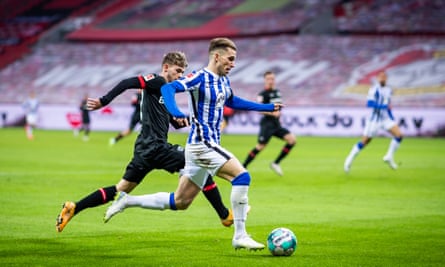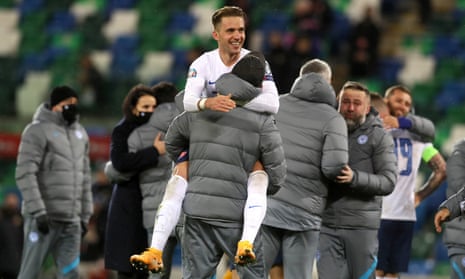This article is part of the Guardian’s Euro 2020 Experts’ Network, a cooperation between some of the best media organisations from the 24 countries who qualified. theguardian.com is running previews from two countries each day in the run-up to the tournament kicking off on 11 June.
In December 2006, playing in front of sold-out stadiums in the Bundesliga and at major international tournaments looked like a long way to go for 20-year-old Slovakian right-back Peter Pekarík.
The MSK Zilina youngster has just made his international debut in Abu Dhabi against United Arab Emirates, in front of 1,000 spectators, as Slovakia won 2-1. It was a transitional period for the Slovakian side. One year after crashing out of a World Cup play-off with a heavy 5-1 loss against Spain, Slovakia went through a generation change.
The newly appointed national team coach, Jan Kocian, had to lead it. After an unsuccessful start to the Euro 2008 qualifiers Kocian, a former Czechoslovakia international who also played in Germany, was given the job to build a new team.
In a lot of games, he simply improvised. That was the case in Abu Dhabi: some of the players have never played in the national team again. However, Pekarik has. So far he has earned 99 caps and just two and a half years after playing in that forgettable fixture against UAE, he celebrated winning the Bundesliga title with Wolfsburg.
“They gave me this task: to rebuild the national team,” Kocian recalls. “People were patient, we didn’t care so much about results. You cannot do a generation change in one game, or throw out everyone from the dressing room all at once.” He gave many of Slovakia’s future leaders a chance – Pekarik, Adam Nemec, Tomas Hubocan and, of course, Marek Hamsik providing a stepping stone for a decade of Slovakian success.
Kocian was sacked after failing to qualify for Euro 2008, and the Slovakian FA appointed Vladimir Weiss Sr, who had previously led Artmedia to the Champions League group stage. Under Weiss’s leadership, Slovakia made it to the 2010 World Cup, a first appearance in a major tournament for the country since it gained its independence in 1993.
Slovakia had earned their place in South Africa after a hard-fought 1-0 victory against Poland on a snowy pitch in Chorzow, in an improvised lineupin which Pekarik was involved. “We ran into that game thinking we have to be successful, even if we had to play with broken legs,” he said afterwards.

Even if he never reached the fame of Hamsik or former Liverpool centre-back Martin Skrtel, everyone in Slovakia knew his worth. For 15 years, he has been the only consistent modern wing-back Slovakia have had. Hence, when Weiss Sr took over, it was j sensible to build the team around a guy like Pekarik. The boy from Zilina was the guy coaches could rely on. That’s why Hertha Berlin fans nicknamed him “Mr Zuverlässig” (Mr Reliable) later in his career.
Before 2010, Slovakia had never appeared on a big stage, but Euro 2020 will be a third major tournament. Pekarik was a key player at the 2010 World Cup and at Euro 2016, and his leadership qualities are important as ever this summer, too.
Pekarik is just a total professional, whom every coach has loved. “He is a little bit inconspicuous, but he always gives 100%,” Weiss Sr stated. When Weiss was replaced by Jan Kozak – who led the team to Euro 2016 – there was no question about who would play as right-back. Pekarik’s position in the side has been just as constant as Hamsik’s. He always acted as a positive influence in the dressing room, too, and never behaved like a star. When the Slovakian public at times criticised the national team, the cruel words often avoided Pekarik: because of how hard-working and quiet he has been.
Perhaps it has something to do with his tough start in Slovakia. He had to play in the local league, while many of the talented youngsters, including Vladimir Weiss Jr, Robert Mak or Hamsik, left before playing in the Slovak top flight for academies abroad. Pekarik made his name in his home country first.
After he returned from a loan at Dubnica, he quickly earned a place in the Zilina side, and never looked back, leading them to the Slovakian title in 2007. In January 2009, Felix Magath signed him for Wolfsburg. At that time, Magath predicted “a big future” for him in the Bundesliga. He might not even have realised how prophetic that was. The 2020-2021 season is Pekarik’s 13th in the German league.
“Those years were varied,” he said to Slovakia’s Denník N newspaper. “With Wolfsburg, I won the Bundesliga title, we also played in the Champions League and got into Europa League quarter-finals. I had calm seasons at Hertha, where we also played Europa League. It all went smooth. However, some seasons were hard., but I held onto my place. That all gives me power.”
After he dropped out of Wolfsburg’s lineup, Pekarik even went for a long-year loan to Kayserispor in Turkey. Then he returned to Germany and became Hertha’s “Mr. Zuverlässig”. With his contract at Hertha expiring at the end of June, it’s still unclear what the future holds for him. However, at the age of 34, he is as important as ever for Slovakia’s hopes this summer in a group with Spain, Sweden and Poland
As the team’s unconvincing form over the last two years indicates, another generation change is already going on. At left-back, it didn’t go too well, as Tomas Hubocan had to return from retirement to help out. Also Jan Durica and Skrtel were a reliable centre-back duo for 13 years, and they will be missing. However, Pekarik plays on and Slovakia fans know when he goes he will leave behind shoes almost too big to fill.
Lukas Vrablik writes for Denník N
Follow him on Twitter @LukasVrablik
For a tactical guide on Slovakia click here.

Comments (…)
Sign in or create your Guardian account to join the discussion